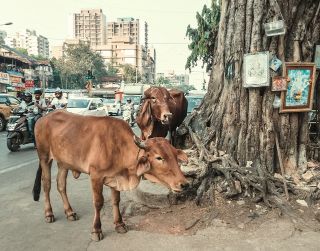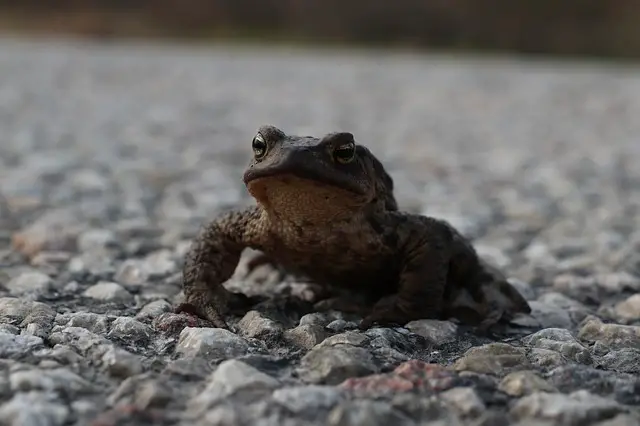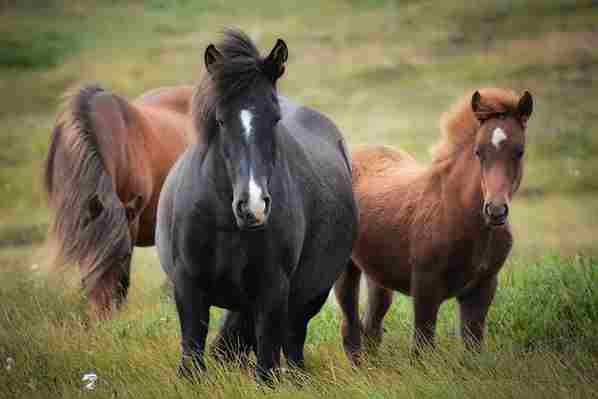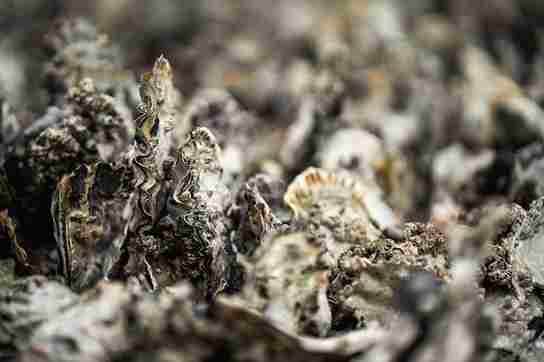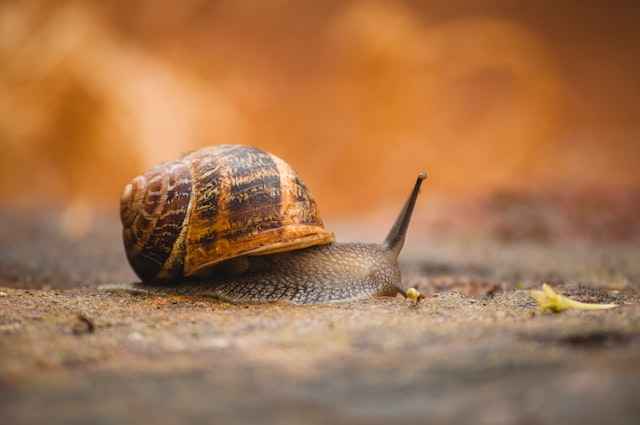Why Do Goats Flap Their Tongues? (Revealed!)
If you are a fan of goats or have one as a pet, then you may have noticed a few strange behaviors about them. Chances are that you have seen them flapping their tongues. So, like most people, you may be wondering – why do goats flap their tongues?
Simple, male goats flap their tongues to test the air for the scent of a female goat that is available for mating. When female goats are in heat, they release a hormone known as pheromones. The scent or smell of the pheromones is what announces them to the male goats.
Goats are widely domesticated animals. They are ruminant animals, and contrary to popular beliefs, they are very smart and intelligent creatures.
They often exhibit numerous behaviors, including the flapping of their tongues. In this article, we will look at why goats flap their tongues, why they wag their tails and a few other traits that may not appear normal.
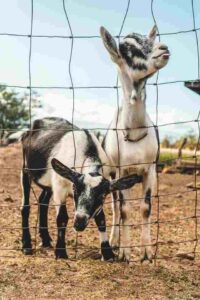
Do goats flap their tongues?
Yes, goats flap their tongues. They do this to pick up the scent of a female goat that is available and willing to mate. This flapping of the tongue is done by male goats only.
When the male goat successfully finds a female goat ready to mate, the female goat will wag her tail continuously while maintaining a still position to allow the male goat to mount her. Oftentimes, they may circle and carry out a form of foreplay for like 5-10 minutes before they eventually mate. When they do mate, the sex usually lasts a few seconds.
Why do goats flap their tongues?
Goats flap their tongues to track the scent of a female goat that is on heat and available for mating.
Mating in goats often occurs after the female goat or doe releases hormones called pheromones, and this takes place between 18 to 21 days during fall. The smell of pheromones is what helps the male goat or buck to know which doe is in heat.
In the same manner, the male goat also releases a very potent musky smell that attracts the female goat. In other words, it’s not really the tongue lashing that draws the doe but the strong musky aroma.
Why does my goat keep licking me?
A goat licking you is usually a sign of affection. Goats only lick when they have established some form of connection with a human. They show affection by giving you head rubs and basically any form of petting in their own way.
Just like dogs, goats are sociable animals, and they also like and enjoy petting from humans. So, if goats lick or allow pets from humans, it shows that they feel safe, happy and are very comfortable around you.
You may also find a goat licking when grooming. They groom themselves by scratching their head and necks with their hind legs and licking other parts of their body.
Why do goats wag their tails?
The wagging of a goat’s tail can mean many different things.
First, it can be a sign of happiness. A goat might wag its tail in excitement, usually when they want to feed or come across something they like.
Second, tail wagging can be a show of affection for a human or another goat. If you share a connection with your goat, it’s not uncommon for it to wag its tail when you come in sight. Also, since goats generally don’t like being alone, they can wag their tail to show they are happy when they have a partner.
Most goats will also wag their tail to drive off flies and other insects that flock around the area.
We could go on and on.
Kids also wag their tails sometimes, though not for the reasons above but to spread their scent. This makes it easier for their mothers to identify them. This particular evolutionary behavior is very important to nannies as they can only identify their kids by smell, not physical features.
A she-goat might also wag its tail to spread her scent when she’s on heat. This makes it easy for a prospective male to pick up the smell and know she’s available to mate.
In summary, tail wagging in goats can be seen as a way they communicate their emotions or conditions, which can mean many things – happiness, sexual arousal, fear, aggression, or even a warning for you to stay off.
What is normal goat behavior?
Goats are generally known to be stubborn and badly behaved, but that doesn’t mean they cannot be managed. It all boils down to how well you understand their behaviour.
Being a herd animal, goats do not like to be alone. A feral herd is commonly made up of four goats but can be up to a hundred. The “strongest” or dominant male or female is usually the one that leads the herd. It will remain in charge until it dies or is challenged and defeated by another buck or doe.
Consequently, to maintain its position as the head, a goat will normally demonstrate dominance within its herd. And in most cases, this requires a lot of aggression and inquisition. In fact, goats generally show more aggressiveness than sheep.
Something interesting to note here is that when a new goat is introduced to a herd, it will pick fights with a lot of the members in its new herd in order to establish its place in the herd.
How to tell if a goat is mad?
An angry goat will likely have its furry ears all the way back as it prepares to ram at you. Also, the pitch of its call begins to fluctuate rigorously, going up and down. This behavior is not usual in most goat species, as many are calm, social and friendly animals.
Most of the mad behaviors could be noticed during mating season or when a new goat is added to the herd. This is usually because they try to assert their dominance in their herd. Sometimes this behavior can occur even with humans.
Another way to tell if a goat is mad is by looking at the poop. A distressed goat tends to excrete “diarrhea-like” droppings. These droppings may be due to the stress the animal is experiencing at that particular moment.
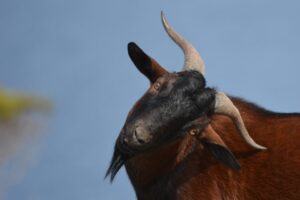
How to tell if a goat is happy?
While some people may keep goats as pets, it’s not the same as having a dog pet. It can be hard to tell when they are happy or sad from their mood or response. With this in mind, if you notice any of the signs listed below, then it might mean that your goat is happy.
- The goat’s ears are pointed forward most of the time
- The calls are more even or stable
- Wanting to be petted or played with
- The goat wags its tail or points it up more often
- Having healthy, solid poop (diarrhea-like or discolored feces is usually a sign that the goat is stressed or unhappy)
- Doesn’t show aggression, ram or run away
- Locking eyes with you often
- Shows more curiosity (they try to taste more things, explore their surroundings, and dart around their pen with more energy than they usually do)
- Associates more with other goats or humans (hangs out more and for longer).
- They respond quickly when you call them.
A happy goat is always a real joy to the owner. So, in all your doings, try to make them happy!
FAQs
Why do goats smell their urine?
Goats usually smell their urine to identify members of their herd, and this is because no two goats have the same urine smell. It is not uncommon for bucks to rub their inner legs, faces, and beards with their urine to preserve their manly scent. Also, a buck may smell the urine of a female to determine if she’s in heat.
Why do goats paw at you?
When a goat paws at you, it’s simply asking for your attention. Younger goats or kids tend to be more attention-seeking and may paw at your leg continuously or nibble your clothes or fingers to get you to pet them, play with them, or feed them. Older goats also exhibit this behavior but to a lesser extent.
Why do goats paw at the ground?
Bucks normally paw the ground when they can’t find a doe to mate with. Likewise, a doe will paw the ground when she’s on heat and can’t find a buck to mate with. It can also paw the ground when in labor.
Other reasons goats paw the ground include:
- To make the comfortable to lay down
- To let you know they’re near the end of their pregnancy
- To let you know, they’re hungry or thirsty
Conclusion
Goats, unlike other animals, aren’t very expressive, and their behavioral pattern can be quite challenging to discern. The more time you spend with them, the more you’ll get acquainted with their behavior.
Whether you own a goat as a pet or rear them for profit, you’ve probably had your own share of funny and strange animal moments. Tongue lashing is just one. Let us know if you have any more questions about why do goats flap their tongues. Until then, happy flapping!
References
https://www.acsedu.co.uk/Info/Pets/Animal-Behaviour/Goat-Behaviour.aspx
